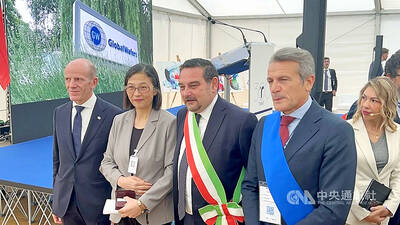The Financial Supervisory Commission yesterday announced it would extend the deadline for its blanket deposit guarantee to the end of next year in a bid to stabilize the domestic financial markets.
“The commission has reached a consensus with the finance ministry and the central bank on the policy’s extension upon final approval from the Cabinet,” Hsiao Chang-jui (蕭長瑞), deputy director-general of the commission’s banking bureau, told a media briefing.
On Sept. 18, Premier Wu Den-yih (吳敦義) said the government would extend the full guarantee on bank deposits for one year to the end of next year.
The policy, which was brought in by former premier Liu Chao-shiuan (劉兆玄) last October, took effect on Nov. 1 and was to expire at the end of this year.
Hsiao said the policy extension was finalized because it has proven effective in easing panic among depositors and prevented bank runs.
Taiwan also aims to stay in sync with neighboring economies such as Singapore and Hong Kong, where deposit guarantee policies also end next year, he said.
As a supporting measure, the commission said that it would strengthen its oversight on the banking sector to avoid any potential moral hazards, while continuing to keep tabs on ill-performing banks.
The commission will immediately order banks that fail to meet its required 8 percent Bank for International Settlements (BIS) ratio to raise capital, he said. The BIS ratio is often used to measure a bank’s financial strength.
“By law, the commission is entitled to shut down any banks whose BIS ratio falls below 2 percent,” Hsiao said.

RECYCLE: Taiwan would aid manufacturers in refining rare earths from discarded appliances, which would fit the nation’s circular economy goals, minister Kung said Taiwan would work with the US and Japan on a proposed cooperation initiative in response to Beijing’s newly announced rare earth export curbs, Minister of Economic Affairs Kung Ming-hsin (龔明鑫) said yesterday. China last week announced new restrictions requiring companies to obtain export licenses if their products contain more than 0.1 percent of Chinese-origin rare earths by value. US Secretary of the Treasury Scott Bessent on Wednesday responded by saying that Beijing was “unreliable” in its rare earths exports, adding that the US would “neither be commanded, nor controlled” by China, several media outlets reported. Japanese Minister of Finance Katsunobu Kato yesterday also

Jensen Huang (黃仁勳), founder and CEO of US-based artificial intelligence chip designer Nvidia Corp and Taiwan Semiconductor Manufacturing Co (TSMC, 台積電) on Friday celebrated the first Nvidia Blackwell wafer produced on US soil. Huang visited TSMC’s advanced wafer fab in the US state of Arizona and joined the Taiwanese chipmaker’s executives to witness the efforts to “build the infrastructure that powers the world’s AI factories, right here in America,” Nvidia said in a statement. At the event, Huang joined Y.L. Wang (王英郎), vice president of operations at TSMC, in signing their names on the Blackwell wafer to

‘DRAMATIC AND POSITIVE’: AI growth would be better than it previously forecast and would stay robust even if the Chinese market became inaccessible for customers, it said Taiwan Semiconductor Manufacturing Co (TSMC, 台積電) yesterday raised its full-year revenue growth outlook after posting record profit for last quarter, despite growing market concern about an artificial intelligence (AI) bubble. The company said it expects revenue to expand about 35 percent year-on-year, driven mainly by faster-than-expected demand for leading-edge chips for AI applications. The world’s biggest contract chipmaker in July projected that revenue this year would expand about 30 percent in US dollar terms. The company also slightly hiked its capital expenditure for this year to US$40 billion to US$42 billion, compared with US$38 billion to US$42 billion it set previously. “AI demand actually

Taiwan-based GlobalWafers Co., the world’s third largest silicon wafer supplier, on Wednesday opened a 12-inch silicon wafer plant in Novara, northern Italy - the country’s most advanced silicon wafer facility to date. The new plant, coded “Fab300,” was launched by GlobalWafers’ Italian subsidiary MEMC Electronics Materials S.p.A at a ceremony attended by Taiwan’s representative to Italy Vincent Tsai (蔡允中), MEMC President Marco Sciamanna and Novara Mayor Alessandro Canelli. GlobalWafers Chairwoman Doris Hsu (徐秀蘭) said the investment marked a milestone in the company’s expansion in Europe, adding that the Novara plant will be powered entirely by renewable energy - a reflection of its